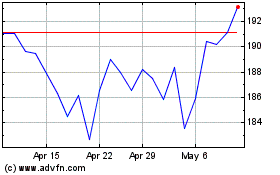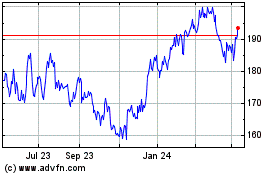By Christian Berthelsen
After the Federal Reserve pledged to crack down on banks engaged
in the lucrative business of commodities trading, most big Wall
Street firms got out.
Macquarie Group Ltd. took the opposite approach.
Australia's largest investment bank has been buying and selling
increasing amounts of oil, natural gas and fuel in the U.S., taking
advantage of the opening as its competitors backed away.
It now is North America's third-largest trader of physical gas,
trailing only industry giants BP PLC and Royal Dutch Shell PLC,
according to industry publications Platts and Natural Gas
Intelligence.
Macquarie investment funds own and manage electric utilities in
Seattle and Pittsburgh, a gas distributor in Hawaii, a merchant
power-generation company in Rhode Island and petroleum storage
tanks along the U.S. Gulf Coast. It imports Canadian oil into the
U.S. by pipeline and in January imported 200,000 barrels of crude
by tanker from the Republic of Congo, U.S. records show.
It all has been possible because the Federal Reserve doesn't
consider Macquarie's U.S. unit a bank. By avoiding certain
activities like taking customer deposits, the Sydney-based firm,
with more than half of its $147 billion in assets in the Americas,
is instead classified as a representative office of a foreign
company.
"There's no question Macquarie has taken advantage of" that
classification, said James Newsome, a former chairman of the U.S.
Commodity Futures Trading Commission whose firm, Delta Strategy
Group, represents banks in dealings with regulators. "The fact
they're not registered as a bank-holding company in the U.S. gives
them the ability to stay active in these markets."
Macquarie officials say the firm doesn't have to be treated as a
bank in the U.S. because it doesn't have a banking license, has no
access to Fed funding and doesn't take deposits.
Big banks jumped into commodities trading in the 1980s, buying
up pipelines, metals warehouses and power plants to trade barrels
of oil, megawatts of electricity and ingots of aluminum. Morgan
Stanley, Goldman Sachs Group Inc. and J.P. Morgan Chase & Co.
became the heavyweights of a group known as the Wall Street
refiners.
The banks presided over an unprecedented commodity boom during
the 2000s. But the business slumped in recent years after a steep
and broad-based commodities-market decline and waning investor
interest.
Regulators and Congress began examining bank activities in the
commodity markets in 2013. They feared damage to the financial
system if a calamity occurred, and worried that the trading
information gave the firms unfair advantages.
In 2014 testimony before a U.S. Senate committee, Fed governor
Daniel Tarullo said the central bank planned to unveil strict new
limits on bank activity in commodity markets in early 2015.
While that hasn't happened, the Fed still is considering what
rules to introduce, people familiar with the matter say.
The threat of new regulation was enough to deter most banks.
Deutsche Bank AG, Credit Suisse Group AG, Morgan Stanley and J.P.
Morgan all closed or curtailed commodity operations. Commodity
revenue at the top 12 global investment banks has declined by
two-thirds since 2008, according to London research-consultancy
Coalition.
Macquarie was founded in 1969 to provide investment-banking and
merger-advisory services in Australia. It obtained its Australian
banking license in 1985.
Macquarie became a U.S. representative office in 2005. Its
global commodities revenue hit $960 million in its most recent
reporting year through March, up 75% since its reporting year ended
March 2013.
While it doesn't break out its U.S. results, nearly half the
firm's commodity- and financial-market revenue comes from the
Americas.
Macquarie's expanding presence in raw-materials markets also has
helped it boost business in parts of the company that handle more
traditional banking activities, particularly for U.S. companies in
the oil, gas and energy industries.
The firm's ranking in U.S. energy-stock underwriting jumped to
12th in 2015 from 29th in 2009, managing six deals with a value of
$471 million, according to Dealogic. And though representative
offices are prohibited from making loans, Macquarie has become a
provider to the U.S. energy industry of a particular kind of
high-risk credit, extending $3 billion in leveraged loans in the
past five years. It has done so by building relationships with U.S.
companies and having foreign offices handle the closing on the loan
agreements, which is allowed under U.S. law.
While trading for clients and with the firm's own balance sheet
has been profitable for Macquarie, it isn't without risk.
Commodities markets are volatile and can lead to sharp losses for
financial traders who suddenly find the market moving against
them.
It also exposes traders to the sort of perils that may be
unfamiliar to banks, from pipeline explosions to hazardous spills
when transporting oil. In addition to disrupting the business, such
incidents can lead to costly lawsuits.
Corrections & Amplifications
Australian bank Macquarie Group Ltd. has $147 billion in assets.
A previous version of this article incorrectly stated the bank's
assets are $350 billion. Macquarie isn't one of the largest
providers of leveraged loans to the U.S. energy industry. The
article incorrectly said it was. Macquarie investment funds own and
manage utilities and other energy assets in the U.S. The story
incorrectly stated the bank owned these assets. (June 9, 2016)
Write to Christian Berthelsen at
christian.berthelsen@wsj.com
(END) Dow Jones Newswires
June 09, 2016 15:33 ET (19:33 GMT)
Copyright (c) 2016 Dow Jones & Company, Inc.
Macquarie (ASX:MQG)
Historical Stock Chart
From Mar 2024 to Apr 2024

Macquarie (ASX:MQG)
Historical Stock Chart
From Apr 2023 to Apr 2024
